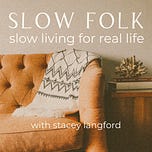The Kitchen Sink Series from Slow Folk is a raw and imperfect podcast for rabble-rousers, dawdlers, late-bloomers and taboo-breakers, thirsty for a slower life in a world obsessed with speed.
Unscripted and unedited - straight from my kitchen sink.
(Warning - all the swears in this episode as I navigate my rage the morning after a scathing, petty, one-star ‘anonymous’ review from a nightmare customer.)
What if the customer ISN’T always right?
What if we as small business owners decided it isn’t just about the money?
That having something to sell isn’t synonymous with being a doormat?
If we want to build values-based businesses rooted in community and connection, we need to be proactive about kicking the a-holes to the door, guilt-free - even if that means the odd anonymous negative review.
It is OK to have boundaries as a small business owner.
It is ok to say NO to customers. Yes, really.
Not all business is good for our business. Remember the 80/20 rule.
That tiny number of folks who aren’t a fit, who don’t respect us or our boundaries - those people, if allowed to stay, will continue to cause havoc - costing us both our money and our peace.
Learning to identify who is and - more importantly - who isn’t our people, is key if we want to build a values-driven, heart-centered business that we actually enjoy.
( Joy matters in business. When it comes to practicing Slow Business, JOY is a core KPI. )
Choosing to set boundaries as business owners means that inevitably we will run into customers who refuse to respect them.
Instead of bending over backwards for these folks, hold firm.
Will they complain? The worst will, absolutely - loudly and publicly and probably not very truthfully.
Will it sting? You freakin’ bet.
Should we stand by our principles, regardless? Absolutely.
If we want to truly belong, to find our people, we’ve got to muster up the courage to be disliked.
It’s only heavy if you carry it.
Stacey Langford is a writer, renegade farmer and slow business mentor living and working in Canada’s Fraser Valley. In 2010 Stacey ditched her cubicle in the city to turn her attention homeward, farm and help others craft a simple life, from scratch.











Share this post